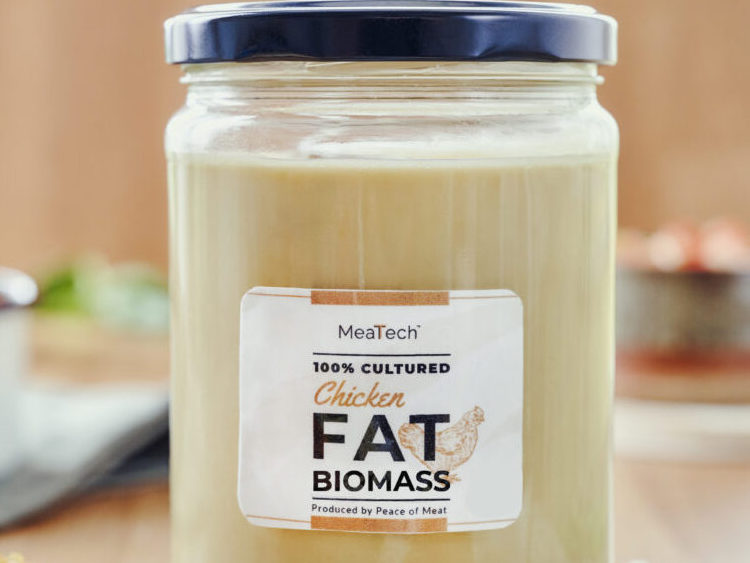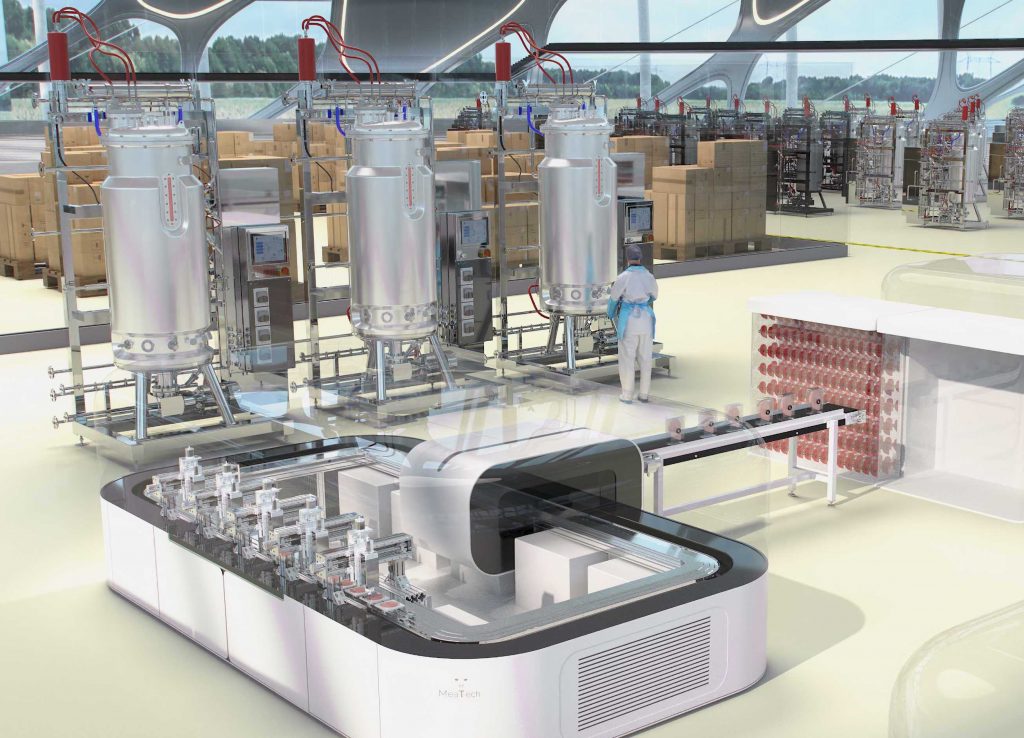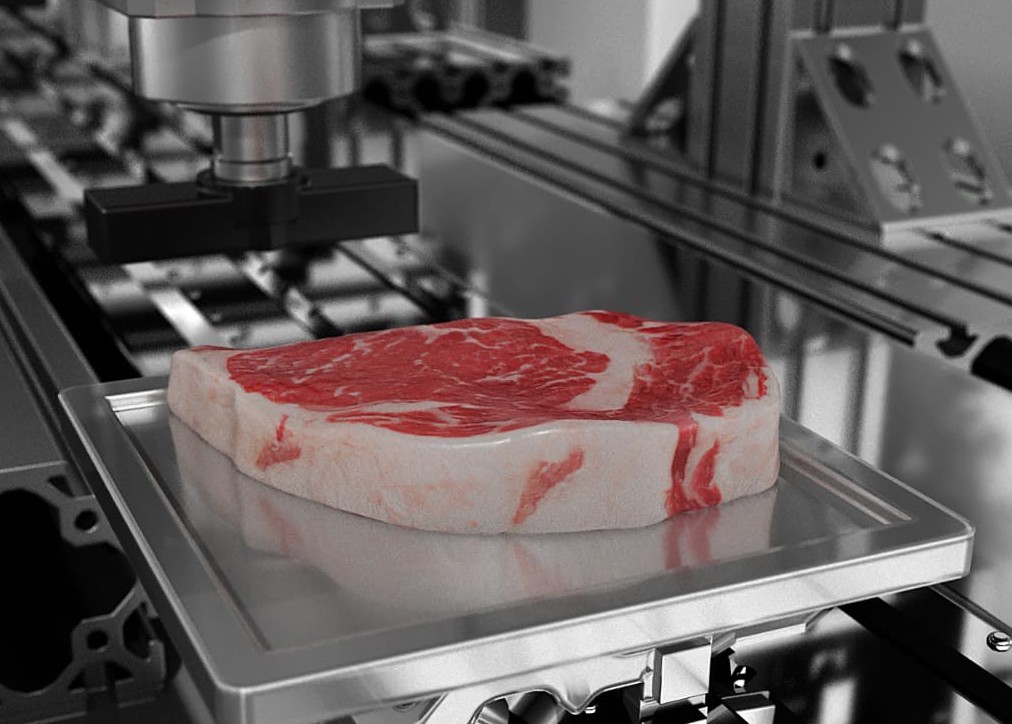Israeli food-tech firm MeaTech has reached another landmark in its mission to develop a tasty yet eco-friendly 3D bioprinted alternative to organic meat products.
In what’s believed to be the first biomass 3D printing demo of its kind, the firm has managed to cultivate just over 700 grams of pure chicken fat, within a single run. Developed via its subsidiary, Peace of Meat, the deposit is said to behave just like real fat, and pending approval, MeaTech now intends to produce it at a pilot plant next year, from which it will be marketed as a taste-enhancing ingredient.
Since announcing its breakthrough, the company’s shares have risen 11% from $5.30 to $5.90, suggesting that the advance has captured the attention of investors. The business initially traded on the Tel Aviv Stock Exchange, but it has since delisted, and become the first cultured meat business to trade on Nasdaq instead.
“Our short-term goal is that cultured chicken cells can be commercialized by MeaTech in strategic hybrid product development collaborations,” explains David Brandes, MD of Peace of Meat. “Today’s preliminary production success brings us one step closer to our longer-term goal of changing human diets towards more sustainable, yet equally savory, food choices.”
“Producing this quantity of pure cultured material in one run is a breakthrough towards potentially manufacturing cultivated chicken fat at an industrial-scale and cost-parity.”

A significant (albeit lardy) step
According to MeaTech, many meat consumers currently enjoy eating fully-plant-based alternatives, but find that they “fall short of replicating the meatiness” of the real thing. This is largely down to the difficulty of producing sufficient biomass for a full meal, and accurately replicating the texture and flavor of organic foodstuffs, such as beef, pork or chicken.
Using cultured chicken fat, on the other hand, MeaTech says that only a small concentration of around 10% is needed, to make a sensory impact in plant-based meat dishes. That’s why the company has set out plans to culture animal fats at-scale, which deliver the signature flavors, aromas, and textures currently derived from conventionally-farmed meat.
Dubbed ‘hybrid meat,’ this emerging food category effectively sees plant-based and cultivated meat ingredients mixed together, with the aim of creating palatable vegan-friendly meals. In a survey carried out prior to its acquisition, Peace of Meat reportedly found that up to 68% of respondents would likely incorporate cultivated fat into their products, results that Brandes described at the time as “eye-opening.”
“The impact this industry has on animal welfare and sustainability is tremendous, yet convincing meat-eaters to change diets permanently remains a challenge,” Brandes told the Vegconomist. “Cultured fat might be the missing ingredient creating real meatiness, and the plant-based industry is very receptive to this innovation.”

MeaTech’s plans to beef-up
With its 700-gram chicken fat haul, MeaTech has successfully demonstrated the viability of its technology for producing poultry fat and muscle cells at-scale, but its ambitions don’t stop there. In fact, since the firm went public on the Nasdaq Capital Market earlier this year, it has raised $28 million, providing it with the backing to not only acquire Peace of Meat, but ramp-up its product R&D and wider expansion.
Within its Q2 2021 financials, MeaTech revealed that it had invested $6 million during the first half of the year, including a lump sum of $2.1 million, which was ploughed into research and development. One of the firm’s particularly-hot areas of R&D surrounds the novel bioprinting technology it patented earlier this year, which is said to yield “exceptional bio-ink control” during meat substitute production.
With further advances, the firm believes that the technique could enable the 3D printing of premium, thicker meat ‘cuts,’ with a higher level of resolution than is currently possible. The firm has also begun researching how to scale the bioprinting of pork, signing a non-binding letter of intent alongside food retailer Tiv Ta’am last month, with this goal in mind.
Working with its new partner, MeaTech aims to establish joint production, marketing and distribution activities, in a way that its CEO Sharon Fima says, could give rise to an “agricultural revolution” which makes meat “safe, abundant and sustainable.”
“We intend to continue leveraging our 3D bioprinting technologies, which we believe to be the optimal technology to create structured meat tissues, such as steaks, under lab conditions,” Fima said last month. “We believe that developing additional cultured meat product lines has the potential to expand our addressable markets, generating additional revenue potential.”

3D printing’s meat market
Over the last year, a number of other firms have also sought to capture the mass-market potential of 3D printed vegan-friendly meat alternatives. Redefine Meat, for instance, was set up in 2018, but it has recently ramped-up its commercial activities, launching its first-ever ‘New-Meat’ kebabs, burgers and sausages in restaurants and hotels during July.
Over in Barcelona, meanwhile, bioengineering startup Novameat has unveiled plans to enter the mass market by 2022. Having initially 3D printed a steak from rice, peas, and seaweed three years ago, the company has now developed an upgraded ‘steak 2.0’ that’s not only said to mimic the taste and texture of the genuine article, but is set to be marketed towards consumers, bars and restaurants alike.
Elsewhere in Israel, SavorEat has made similar advances in the R&D of its stem cell-derived 3D printed meat tissues. Having raised $13 million in funding through its IPO on the Tel Aviv Stock Exchange (TASE) last year, the company has now agreed to take part in a pilot with burger chain ‘BBB,’ in which it’s set to collaborate with the franchise on product development and system installation.
To stay up to date with the latest 3D printing news, don’t forget to subscribe to the 3D Printing Industry newsletter or follow us on Twitter or liking our page on Facebook.
For a deeper dive into additive manufacturing, you can now subscribe to our Youtube channel, featuring discussion, debriefs, and shots of 3D printing in-action.
Are you looking for a job in the additive manufacturing industry? Visit 3D Printing Jobs for a selection of roles in the industry.
Featured image shows a jar of MeaTech’s 3D printed chicken fat. Photo via MeaTech.


